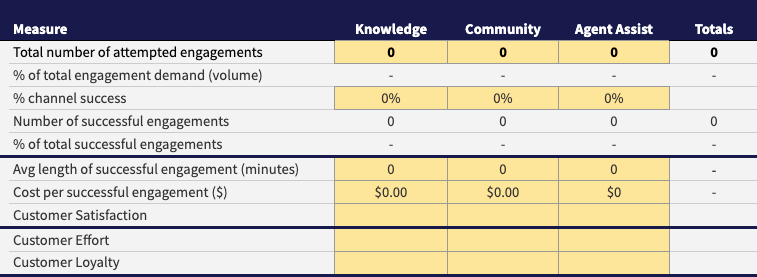Measuring Self-Service Success: Understanding Success by Channel
Improved customer success due to better knowledge-sharing is a key benefit of KCS. How can we determine the value of knowledge delivery across multiple channels, particularly for self-service and community implementations?
Experience has shown that robust self-service and community experience provides more value than just cost savings, but quantifying this is a complex endeavor. Consortium Members aim to provide a comprehensive view of the value of delivering knowledge across all relevant channels within a company.
We propose tracking a short list of measures over time (the Service Engagement Measures Spreadsheet) to provide visibility to your organization's total demand for knowledge and understand how that demand is being fulfilled.

This resource, offered as a supplement to the Measurement Matters v6 paper, reflects ongoing work by a group of 40+ Consortium Members from 18 Member companies of various sizes and markets.
- Background and Context
- Why and how we seek to measure knowledge success.
- Executive Overview
- How can we measure the return on investment in knowledge?
- Assumptions and Limitations
- Assessing customer self-service and community experiences is difficult and there is no one measure that indicates success.
- Prerequisites
- Meaningful channel measurement requires you to consider definitions for your organization, access to data, and time within your organization.
- Service Engagement Measures Spreadsheet
- The spreadsheet is divided by types of measures and offers good, better, and best methods to gather data.
- Glossary of Terms
- Definitions relevant to self-service measures and in the context of customer support.
- Project Acknowledgements
- History and participants.
